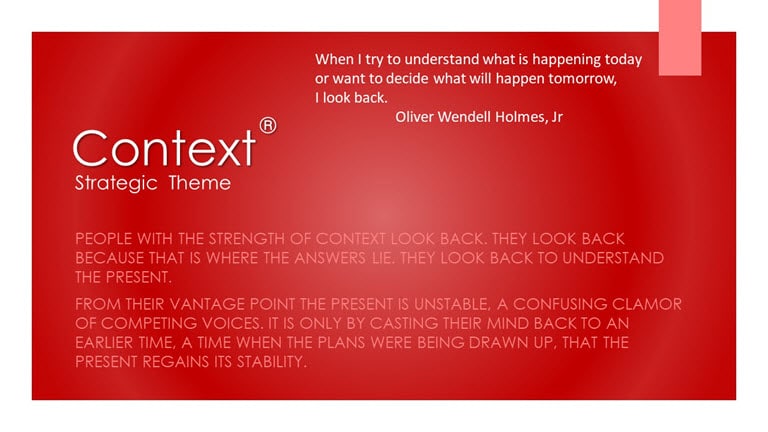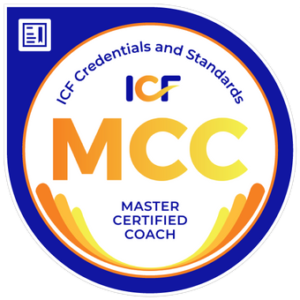
Does your organization have someone who is the resident historian? Do you enjoy all the details of past decisions and fill everyone in on those to avoid pitfalls for the future? How can you monetize the strength of Context®?
Context is a unique strength in which people’s brains look backwards in order see forwards. Contextual individuals feel that the present moment is connected to the past. They feel more alive when looking at history—the history of mankind, the history of a relationship, the history of success.
Contextual individuals relate and devise plans by looking at the past. I have a couple of different clients with this particular strength. One is a therapist who monetizes her Context by asking questions about where clients grew up and what their experiences were. The more she learns about a person’s history, the more it helps her relate to the individual in the present.
My other client is a person who honors the past. He loves reflecting on his childhood, which he looks upon as the best, most successful, most enjoyable time in his life. In fact, he is struggling to adapt to his adult life and his mind sometimes fixates on his childhood because it’s the time when he felt the most successful.
One of the things that we decided to do together to help him deal with his present was to create a special room—kind of like a “man cave”— in his house. This room is separate from his wife and kids, and it’s filled with memorabilia and items from his childhood. He also filled it with items representing his present interests—historical reenactments of Bonnie and Clyde, vintage clothes, cars, weapons, and books on the history of the 1930’s. His daily time in this room working on crafts and hobbies energizes him because he surrounds himself with positive history.
People who have the strength of Context typically love case studies. They enjoy taking a real person or civilization from the past and exploring. If you give them Rome, they want to know what caused it to rise and fall, as well as everything that happened along the way.
Howard Carter was a British archaeologist and Egyptologist who became world-famous and wealthy after discovering the intact tomb of the 18th Dynasty Pharaoh, Tutankhamun, in November 1922.
Carter spent much of his childhood with relatives in the Norfolk market town of Swaffham. Nearby was the mansion of the Amherst family, Didlington Hall, containing a sizable collection of Egyptian antiques, which sparked Carter’s interest in that subject.
He began working in archeology in 1891 at the age of 17. In 1907, Lord Carnarvon employed him to supervise excavations of nobles’ tombs near Thebes. (Though you may not be familiar with Lord Carnarvon’s name you may be familiar with his family home. His country house, Highclere Castle, serves as the filming location of the ITV/PBS television series Downton Abbey)
By 1922, Lord Carnarvon had become dissatisfied with the lack of results after several years of finding little. He informed Carter that he had one more season of funding to make a significant find in the Valley of the Kings. It looked like Carter’s time was over but he pushed on.
On 4 November 1922, their young water boy accidentally stumbled on a stone that turned out to be the top of a flight of steps cut into the bedrock. Carter had the steps partially dug out until the top of a mud-plastered doorway was found. The doorway was stamped with indistinct cartouches (oval seals with hieroglyphic writing).
On 26 November 1922, Carter made a “tiny breach in the top left-hand corner” of the doorway, with Carnarvon, his daughter Lady Evelyn Herbert, and others in attendance, using a chisel that his grandmother had given him for his 17th birthday. He was able to peer in by the light of a candle and see that many of the gold and ebony treasures were still in place. He did not yet know whether it was “a tomb or merely an old cache”, but he did see a promising sealed doorway between two sentinel statues. Carnarvon asked, “Can you see anything?” Carter replied with the famous words: “Yes, wonderful things!” Carter had, in fact, discovered Tutankhamun’s tomb.
Often, they take the information gathered and use it to help their business. Contextual people are not “Deja vu” people, they are “vuja de” people. Vuja de helps us understand the past and how the past affects the future. The Contextual individual’s mindset is focused on understanding the past in order to make the present and future better.
How could you monetize your Context strength? What career could you enjoy with your Context strength like Howard Carter? Let’s have a conversation.
Remember you can schedule your Ask Brent Anything call. Let’s talk about strengths.





